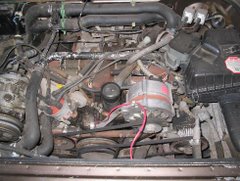Beginning Monday, July 30, this blog will document the conversion of a 1985 Volkswagen Vanagon to a fully-electric vehicle that can be charged by ordinary household current. The conversion will be performed by participants in the 2007 EV Conversion Workshop sponsored by Bucks County Renewables with the help of the Energy Justice Network.
The workshop was inspired by the C2EC2T (Commuter Conversion Electric Car Class for Teachers) programs which ran successfully in California over the last two summers. Mike Parker, co-teacher of those classes, is en route now via Amtrak to Pennsylvania to teach the first version of the course to be offered on the East Coast.
This blog is intended to provide the opportunity for interested folks to follow along at home! You'll get to know the ten participants -- most of them auto tech teachers, along with a sprinkling of environmental activists and EV enthusiasts -- and accompany them as they gain hands-on experience with battery and electric drive technology during the course of these two weeks.
I'll be posting photos and a narrative daily, with links to more pictures if needed. Of course, reader comments are welcome. So pass the link to this blog along and join us on the adventure!








5 comments:
Hi, I'm currently taking the C2EC2T class in San Diego. I have a Vanagon Camper that I would like to convert. Could you tell me what kind and how many batteries you're using in your conversion? Since my camper is heavier than your vehicle I'm beginning to think it's not a good candidate for conversion. Any suggestions?
Thanks much!!!! --Ruth
Hi Ruth! We have opted for a 120V system using 20 6volt batteries. It will give us adequate road performance, but our acceleration and speed will remain, well, Vanagonish.
I've had a lot of inquiries about converting campers. A straight Vanagon is a good candidate for EV conversion because all Vanagons are structurally engineered to receive the 1,000 lb camper conversion -- so adding 800+ pounds of batteries is not a big deal. The campers are much heavier to start with, which creates a challenge.
That said, however, Vanagon camper conversions have been done. Steve Heckeroth, who formerly ran the MendoMotive EV conversion company, converted a camper in 1993 and put PV panels on the poptop to charge it during the day. MendoMotive used to sell a kit to convert Vanagons (http://www.renewables.com/ElectricVanConv.htm). He may be able to give technical advice.
If you are not dead-set against internal combustion engines in any form, there are conversions that can be done to revive your camper and improve its mileage.
If it is a gas vehicle, you can swap in a Subaru or Nissan engine
http://www.smallcar.com/index.php?act=viewDoc&docId=1
http://www.vwmaxiwesty.com/about.html
and if it is a diesel you can put in a TDI AND rig it to take biodiesel or WVO:
http://syncro.org/engines.html
Hope this helps your thinking!
J.
oh, THAT link to the blog. Congrats J. Happy eTrails.
-d
Just curious, would a Honda generator substitute for batteries on the eVanagon? Some thing like:
http://www.hondapowerequipment.com/products/modeldetail.aspx?page=modeldetail§ion=P2GG&modelname=EU2000i&modelid=EU2000IAN
Cause it would be sweet to drive around for 15 hours on one gallon of fuel.
Sorry, Michael, it took a while to get to this comment. I had a lot of questions about this at the Energy Fest as well. Some converters do play around with this idea: Don & Bob Young have a mini-generator in the back of their Ford Ranger EV that they want to play around with using as a range-extending battery charger.
I usually tell people it depends what you're trying to achieve: those who want zero emissions won't want to run a polluting generator, while those who want to maximize their daily range won't want to install a heavy piece of equipment into the system. Ken Barbor pointed out on one panel that EV's are a specialized tool, like the appliances in your kitchen. You wouldn't use your oven to make popcorn or the microwave to make an angel-food cake! A pure battery-electric vehicle like the e-Van is great for a daily, limited-range commute. To travel long distances, my family hops in the hybrid instead.
Post a Comment